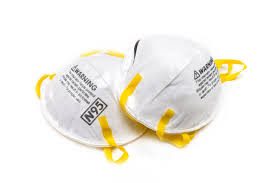Doctors and healthcare systems say it might be time
to change your face masks. With infections surging due to the fast-spreading Omicron variant,
including among the vaccinated, physicians are now urging people to ditch cloth
face masks, which they say may not provide enough protection against the virus.
Instead, they recommend pairing cloth masks with surgical models or moving on
to stronger respirator masks.
The Mayo Clinic began on Thursday requiring
all patients and visitors to wear surgical masks or N95 or KN95 masks. Anyone
wearing a single-layer, homemade cloth mask, gaiter or bandanna, or a mask with
a vent, will be provided a medical-grade mask to wear over it.
Single-layer cloth masks, which many people prefer
for comfort and style, can block larger droplets carrying the virus, but aren’t
as effective in blocking smaller aerosols or particles carrying the virus,
according to infectious-disease specialists.
The Centers for Disease Control and Prevention’s
most recent guidance recommends that people wear masks,
including cloth ones that are multilayered and tightly woven, that fit snugly
and have an adjustable wire nose bridge. It also suggests layering masks, using
a disposable mask underneath a cloth mask and reserving N95 masks for
healthcare workers.
But many professionals in the field say certain
masks are more effective than others in protecting people from the Omicron
variant and that cloth masks alone aren’t. “If you really want no exposure, you
have to wear the right type of mask,” says Monica Gandhi, an infectious disease
specialist at the University of California, San Francisco. Dr. Gandhi
recommends N95 masks, which are certified in the U.S., or the KN95, KF94 and
FFP2 masks, which are certified in China, South Korea and Europe respectively.
If those aren’t available, she recommends double masking—a
multilayered cloth mask tightly on top of a surgical mask. Surgical masks are
made of polypropylene, which has electrostatic charge characteristics that
block the virus. “If everyone is just wearing a cloth mask or just a surgical
mask, it won’t make any difference” with this highly-transmissible variant, she
says. Others in the field say high-quality surgical masks, worn properly, offer
protection, but they would also like more data and research on how they stand
up against Omicron.
N95 masks, which are certified by the U.S. National Institute of
Occupational Safety and Health, have a denser network of fibers than surgical
or cloth masks. That tighter mesh, together with an electrostatic charge in the
material, generally makes such masks the most efficient at trapping larger
droplets and aerosols that are exhaled by the wearer. They also better block
such particles from being inhaled.
Properly fitted, certified N95 masks can filter up
to 95% of particles in the air. “Any mask is better than no mask. But cloth
masks and then surgical masks are not as good as N95-caliber masks,” says Ranu
Dhillon, a physician at Brigham and Women’s Hospital.
Megan Srinivas, a clinician and infectious disease specialist at
the University of North Carolina at Chapel Hill, says she and other family
members wear KN95 masks, which have five layers of overlapping material and a
tighter fit to reduce droplets from escaping or entering. She would recommend
those same masks, which come in children’s sizes, to parents getting ready to send their children to school in
the new year. If those aren’t available, she suggests disposable authorized
surgical masks. “We need to educate the public and say that different quality
masks offer different protection,” she says.
Graham Snyder, medical director of infection prevention and
hospital epidemiology at the University of Pittsburgh Medical Center , says any
quality mask that offers an effective seal and is worn correctly—covering the
nose and mouth—offers protection. Dr. Synder says he would like data from the
CDC on how Omicron spreads and whether the transmission is related to the types
of masks. He is concerned about the number of people in the community who don’t
wear masks of any type. “Masking works. Period,” he says.
Write to Clare Ansberry at clare.ansberry@wsj.com and
Nidhi Subbaraman at Nidhi.Subbaraman@wsj.com

No comments:
Post a Comment
Note: Only a member of this blog may post a comment.